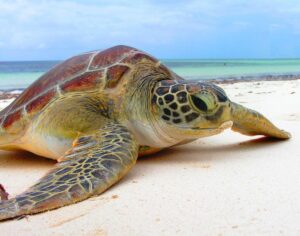Man Arrested in Malindi for Possessing Endangered Turtle
VICTOR KIPCHUMBA September 3, 2024 0
PHOTO: A Turtle
Malindi – September 2, 2024
Kazungu Mwavuo Ngala, a middle-aged man, was arrested in Malindi on Sunday, September 1st, for illegal possession of an endangered turtle. His arrest came after local residents tipped off authorities, leading to his capture as he was transporting the turtle on a motorcycle. Kazungu’s arrest has highlighted the urgent need for increased wildlife protection and enforcement of wildlife laws in Kenya.
Arrest and Charges
Authorities apprehended Kazungu after reports suggested he had been transporting the turtle from Kipini, Tana River County. The Marine Wildlife Conservation Planning Manager, Abigael Cate, confirmed that residents informed them about Kazungu’s illegal activity. Wildlife officers quickly acted on this tip, ensuring his arrest while he was en route to an unknown location with the turtle.
On Monday, September 2nd, Kazungu appeared before Malindi Resident Magistrate Grace Mutemi. He was charged with illegal possession of an endangered species, which is a violation of Kenya’s strict wildlife laws. However, Kazungu denied all the charges, claiming he was unaware of the species’ endangered status. Despite his denial, the court released him on a bond of Ksh 200,000, with an additional surety of Ksh 100,000. The court also scheduled the next mention of the case for September 12th.
Importance of Wildlife Protection
This arrest has underscored the urgent need for more stringent wildlife protection measures in Kenya, particularly around endangered species. Turtles, such as the one Kazungu was found with, are highly vulnerable to illegal poaching and trafficking. The wildlife authorities are investigating how Kazungu obtained the turtle, but the case highlights larger concerns about wildlife trafficking in the coastal regions of Kenya. This issue is of national and international importance as Kenya has been at the forefront of efforts to conserve endangered species.
In recent years, various species of turtles, including hawksbill and green turtles, have seen a significant decline in their populations. Both species are crucial to the ecosystem as they maintain healthy seagrass beds and coral reefs. Despite legal protections, poaching continues due to the high demand for turtle shells and meat. Wildlife officers have intensified their efforts to combat such illegal activities, though challenges remain.
Growing Awareness and Conservation Efforts
Efforts to raise awareness about the importance of wildlife conservation have steadily grown in Kenya, particularly among coastal communities. Several local and international organizations have invested heavily in educating the public on the value of preserving endangered species. These organizations have also collaborated with law enforcement agencies to protect vulnerable species from extinction.
Kenya’s coastal region is a hotspot for marine life, including dolphins, sharks, and turtles. However, due to the allure of financial gain, many residents participate in illegal activities, often unaware of the long-term damage they are causing to the ecosystem. This arrest serves as a reminder that the battle against poaching requires community involvement, legal enforcement, and continuous education.
Legal Consequences and Penalties
Kazungu’s arrest will likely serve as a warning to others who engage in illegal wildlife trade. Kenya has implemented strict penalties for individuals involved in wildlife crimes, especially regarding endangered species. Wildlife crimes carry severe consequences, including hefty fines and lengthy prison sentences. The Wildlife Conservation and Management Act stipulates that any person found guilty of possessing or trafficking endangered wildlife faces a fine of up to Ksh 20 million or life imprisonment.
By enforcing these laws, Kenya hopes to deter individuals from engaging in illegal wildlife activities. Wildlife officers and conservation groups continue to push for more proactive measures, including community education and tighter monitoring of wildlife hotspots. The government has also invested in technology to track poachers and protect wildlife corridors. These efforts, combined with stronger legal enforcement, have the potential to make a significant impact.
Public Response and Concerns
Following the news of Kazungu’s arrest, members of the Malindi community expressed mixed reactions. Some locals expressed concern about the harsh penalties for those caught with endangered species, arguing that many residents lack awareness about wildlife laws. Others, however, praised the authorities for their swift action, emphasizing the importance of preserving Kenya’s rich biodiversity.
A local conservationist, James Mwangi, spoke on the need for increased outreach to coastal communities. He stressed that while legal consequences are necessary, educating the public about the importance of wildlife conservation could prevent future cases. “It’s not just about punishing offenders,” Mwangi said, “It’s about changing the mindset of the community and creating a culture of conservation.”
The Bigger Picture
This incident brings into focus the larger problem of wildlife trafficking, not just in Kenya but globally. Illegal wildlife trade remains one of the most profitable transnational crimes, with species like elephants, rhinos, and turtles being some of the most targeted. The demand for animal products such as ivory, rhino horn, and turtle shells continues to fuel this black market.
Conservationists and law enforcement agencies worldwide are grappling with how to stop this illicit trade. In Kenya, authorities have introduced advanced technology such as drones and camera traps to monitor poaching activities. International cooperation also plays a crucial role, as many endangered species are smuggled across borders. Kenya has worked closely with other countries to dismantle trafficking networks, but the scale of the issue remains daunting.
Moving Forward
As the court prepares for the next mention of Kazungu’s case on September 12th, wildlife advocates hope this incident will bring renewed attention to the plight of endangered species in Kenya. The government, conservation groups, and local communities all have a role to play in ensuring the protection of vulnerable animals.
The incident in Malindi serves as a reminder that protecting Kenya’s wildlife is an ongoing battle that requires constant vigilance. It also highlights the need for community involvement in safeguarding these precious species. With increased education, stricter law enforcement, and enhanced technology, Kenya can continue its efforts to combat wildlife crime and preserve its natural heritage for future generations.
Kazungu Mwavuo Ngala’s arrest in Malindi for illegal possession of an endangered turtle has sparked discussions about wildlife conservation in Kenya. As the case progresses, the importance of enforcing wildlife laws and educating the public becomes clearer. While Kazungu’s case represents just one instance, it sheds light on the broader issue of wildlife trafficking and the critical need to protect endangered species before it’s too late.
4o





